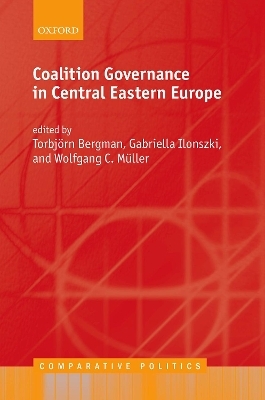
Coalition Governance in Central Eastern Europe
Oxford University Press (Verlag)
978-0-19-884437-2 (ISBN)
Coalition government among different political parties is the way most European democracies are governed. Traditionally, the study of coalition politics has been focused on Western Europe. Coalition governance in Central Eastern Europe brings the study of the full coalition life-cycle to a region that has undergone tremendous political transformation, but which has not been studied from this perspective. The volume covers Bulgaria, Estonia, the Czech Republic, Latvia, Lithuania, Hungary, Poland, Romania, Slovakia, and Slovenia. It provides information and analyses of the coalition life-cycle, from pre-electoral alliances to coalition formation and portfolio distribution, governing in coalitions, the stages that eventually lead to government termination, and the electoral performance of coalition parties. In Central Eastern Europe, few single-party cabinets form and there have been only a few early elections. The evidence provided shows that coalition partners in the region write formal agreements (coalition agreements) to an extent that is similar to the patterns that we find in Western Europe, but also that they adhere less closely to these contracts. While the research on Western Europe tends to stress that coalition partners emphasize coalition compromise and mutual supervision, there is more evidence of 'ministerial government' by individual ministers and their parties. There are also some systems where coalition governance is heavily dominated by the prime minister. No previous study has covered the full coalition life-cycle in all of the ten countries with as much detail. Systematic information is presented in 10 figures and in more than one hundred tables.
Comparative Politics is a series for researchers, teachers, and students of political science that deals with contemporary government and politics. Global in scope, books in the series are characterised by a stress on comparative analysis and strong methodological rigour. The series is published in association with the European Consortium for Political Research. For more information visit: www.ecprnet.eu.
The series is edited by Emilie van Haute, Professor of Political Science, Université libre de Bruxelles; Ferdinand Müller-Rommel, Director of the Center for the Study of Democracy, Leuphana University; and Susan Scarrow, John and Rebecca Moores Professor of Political Science, University of Houston.
Torbjörn Bergman is Professor of Political Science at Umeå University, Sweden. His books on representative democracy, government formation, and political parties include Political Parties in Multi-Level Polities: The Nordic Countries Compared (with N. Aylott and M. Blomgren, Palgrave Macmillan, 2013), The Madisonian Turn - Political Parties and Parliamentary Democracy in Nordic Europe (with K. Strøm, University of Michigan Press, 2011), Cabinets and Coalition Bargaining: The Democratic Life Cycle in Western Europe (with K. Strøm and W.C. Müller, Oxford University Press, 2008) and Delegation and Accountability in Parliamentary Democracies (with K. Strøm and W.C. Müller, Oxford University Press, 2003). He has also published in journals such as the European Journal of Political Research, the Journal of European Public Policy, the Journal of Legislative Studies, Party Politics, Government & Opposition, and Scandinavian Political Studies. Gabriella Ilonszki is Professor of Political Science at Corvinus University of Budapest. Her English language publications include three edited volumes: Opposition Parties in European Legislatures: Conflict or Consensus (with Elisabetta De Giorgi, Routledge, 2018), Post-Communist Parliaments: Change and Stability in the Second Decade (with D.M. Olson, Routledge, 2012), and Perceptions of the European Union in New Member States: A Comparative Perspective (Routledge, 2010). She has published articles in journals such as the Journal of Legislative Studies, East European Politics, Europe-Asia Studies, the Journal of Communist Studies and Transition Politics. She has also authored several chapters in volumes on representation, parliamentary government and political elite, gender, areas that constitute her main research interest. Wolfgang C. Müller is Professor of Democratic Governance at the Department of Government, University of Vienna, Austria. His research interests are government coalitions, political institutions, political parties, political elites, and political economy. He is Director of the Austrian National Election Study (AUTNES), Director of the Vienna Institute for Electoral Research (VieCER), and co-editor of West European Politics. His English-language books include Policy, Office, or Votes? How Political Parties in Western Europe Make Hard Decisions (with K. Strøm, Cambridge University Press, 1999), Coalition Governments in Western Europe (with K. Strøm, Oxford University Press, 2000), Delegation and Accountability in Parliamentary Democracies (with K. Strøm, and T. Bergman, Oxford University).
List of Figures
List of Tables
List of Contributors
1: Wolfgang C. Müller, Torbjörn Bergman, and Gabriella Ilonszki: Extending the Coalition Life-cycle Approach to Central Eastern Europe - An Introduction
2: Anders Backlund, Alejandro Ecker, and Thomas M. Meyer: The Economic and Political Context of Coalition Politics in Central Eastern Europe
3: Rumyana Kolarova and Maria Spirova: Bulgaria: Stable Coalitions of Unstable Parties
4: Zdenka Mansfeldova and Tomas Lacina: Czech Republic: Declining Bipolarity and New Patterns of Conflict
5: Vello Pettai: Estonia: From Instability to the Consolidation of Centre-Right Coalition Politics
6: Gabriella Ilonszki: Hungary: From Coalitions to One-Party Dominance
7: Janis Ikstens and Ilze Balcere: Latvia: Office-seeking in an Ethnically Divided Polity
8: Irmina Matonyte: Lithuania: Ministerial Government in an Unstable Party System
9: Andrzej Antoszewski and Joanna Kozierska: Poland: Weak Coalitions and Small Party Suicide in Government
10: Laurentiu Stefan: Romania: Presidential Politics and Coalition Bargaining
11: Sona Szomolanyi and Alexander Karvai: Slovakia: From National-Populist to Alternating Right and Left Coalitions
12: Alenka Krasovec and Tomaz Krpic: Slovenia: Majority Coalitions and the Strategy of Dropping out of Cabinet
13: Torbjörn Bergman, Gabriella Ilonszki, and Wolfgang C. Müller: The Coalition Life-cycle in Central Eastern Europe
Appendix: The Variables
Index
| Erscheinungsdatum | 26.02.2020 |
|---|---|
| Reihe/Serie | Comparative Politics |
| Verlagsort | Oxford |
| Sprache | englisch |
| Maße | 159 x 240 mm |
| Gewicht | 1024 g |
| Themenwelt | Sozialwissenschaften ► Politik / Verwaltung ► Politische Systeme |
| Sozialwissenschaften ► Politik / Verwaltung ► Staat / Verwaltung | |
| Sozialwissenschaften ► Politik / Verwaltung ► Vergleichende Politikwissenschaften | |
| ISBN-10 | 0-19-884437-9 / 0198844379 |
| ISBN-13 | 978-0-19-884437-2 / 9780198844372 |
| Zustand | Neuware |
| Haben Sie eine Frage zum Produkt? |
aus dem Bereich


